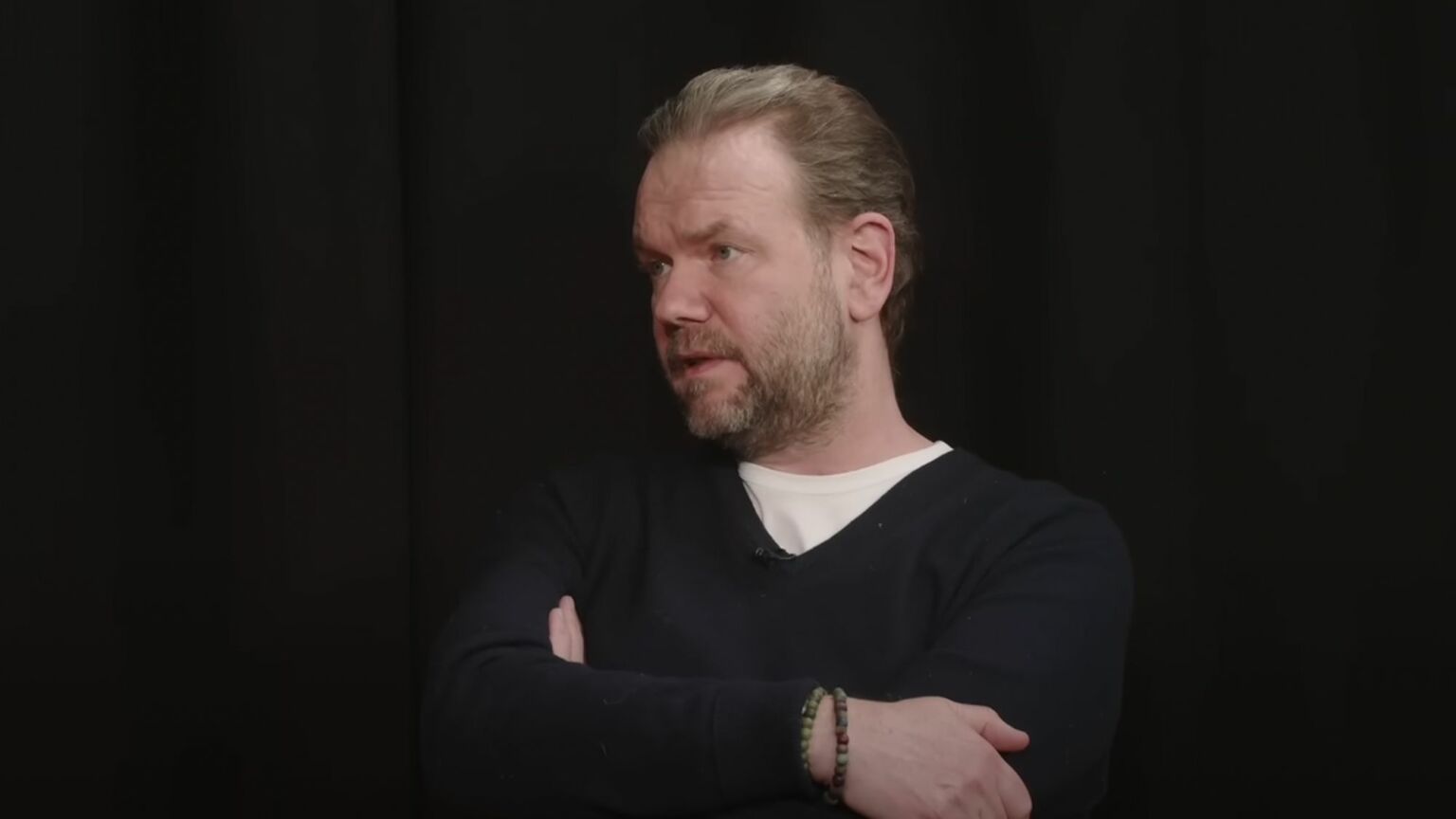The derangement of James O’Brien
How They Broke Britain is a liberal-elite conspiracy theory, stretched over 350 pages of pompous, smug prose.

Want to read spiked ad-free? Become a spiked supporter.
British radio presenter James O’Brien is not easy to warm to. This is mainly due to his personality. A combination of moderate intelligence, a sense of public-schooled entitlement and a gargantuan ego has generated the event horizon of smugness – a man so full of himself it’s a wonder light can escape his presence. Sadly, thanks to his prominent media and social-media profile, we the public now struggle to escape O’Brien, too.
The privately educated son of a Daily Telegraph journalist, O’Brien had been trying to force his views on the public for several years via various media outlets before he finally landed a plum gig on talk-radio station LBC in 2004. It is from this pulpit that O’Brien first began making a name for himself, mainly by humiliating and mocking mostly working-class callers who had the temerity to disagree with him.
There was a blip for O’Brien’s career in 2014-15. Over the course of several months, he played a major role in propagating the idea that there was a murderous ‘VIP paedophile network’ at the heart of the British establishment. He treated the fantastical claims of alleged victim Carl Beech as gospel, and repeatedly invited Mark Watts, the head of media organisation Exaro, on to his show to spread Beech’s claims. They accused a string of prominent people of raping and murdering children. But none of it was true. Beech was himself outed as a paedophile and eventually sentenced to 18 years in jail for fraud and perverting the course of justice. Exaro has long since folded. But not before lives had been ruined by claims O’Brien helped to spread. Something he has never properly apologised for.
Of course, such is his throbbing egotism, O’Brien was never going to let all that stand in the way of his career. Opportunity knocked in 2016, when a majority of mainly working-class Brits voted to leave the EU. Britain’s pro-EU middle classes were suddenly calling out for a vengeful voice with a superiority complex ready and willing to vent their prejudices against all things Brexit. Enter James O’Brien. From that point on, the smug-jock has gleefully turned the full force of his elite contempt on to Leave voters and indeed anyone deemed to be ‘on the wrong side of history’. His shows’ listening figures have soared to nearly 1.5million, and he’s become a pin-up for centrist dads and liberal bigots across the nation.
Not content with smearing those he disagrees with as racists, xenophobes and proto-fascists, and indulging in bien pensant anti-Toryism on his weekday LBC show, O’Brien has now decided to develop this shtick in his fourth book, How They Broke Britain. This follows on from his previous efforts: Loathe Thy Neighbour (2015) on immigration, and two more on the cleverness of James O’Brien, How to Be Right (2018) and How Not to Be Wrong (2020).
At least in O’Brien’s two books on O’Brien he knew a little about the subject matter (although sadly not enough to achieve any degree of self-awareness). The same can’t be said about How They Broke Britain. It purports to be some sort of socio-political, state-of-the-nation analysis. But that’s not what it provides. Instead, it offers up a borderline conspiracy theory to explain Britain’s fictional descent into a post-truth far-right hellhole – a decline that has supposedly accelerated since ‘2010, especially since 2016 and quite spectacularly since 2019’. That is, when the electorate started to disagree with James O’Brien, voting out New Labour (2010), voting for Brexit (2016) and voting for Boris Johnson’s Tories to ‘Get Brexit done’ (2019). Mourning the golden age of New Labour and EU membership, he claims that he ‘still can’t quite believe how far we have drifted from [the status quo ante] and how measurably better things used to be’.
How They Broke Britain reveals the shallowness of O’Brien’s supposed intellect. ‘Obviously, there was no real plan or secret conspiracy to break Britain’, he writes. A serious thinker wouldn’t have to state that. O’Brien has to because that’s precisely what his hysterical title and thin narrative suggest – namely, that Britain’s ‘unnecessary domestic decline and international diminishment’ can be laid at the feet of just 10 people: Rupert Murdoch, Paul Dacre, Andrew Neil, Matthew Elliott, David Cameron, Jeremy Corbyn, Nigel Farage, Dominic Cummings, Boris Johnson and Liz Truss.
As he puts it, ‘this book, then, is a charge sheet: a compendium of poor behaviour and bad actors’. As an approach, it makes for a superficial analysis, a conspiracist inversion of the great-man theory of history, in which the development of modern, post-Brexit Britain is reduced to the ‘poor behaviour’ of a few ‘bad actors’. He effectively personalises impersonal economic and political forces, from the long-standing productivity crisis and the financial crash of 2008 to the emergence of the populist revolt itself.
This is what O’Brien’s puddle-deep thesis boils down to: the UK’s ‘hideously right-wing media’, led by Murdoch and by Daily Mail editor Paul Dacre, created an ‘ecosystem in which dishonesty could flourish and facts wither’. All because, according to O’Brien, Murdoch wants to make money and Dacre is a far-right paranoiac frightened of immigrants. The media has thus ‘commoditised hatred’ and ‘commoditised fear’, laying ‘the red carpet of racism down [on] which Farage could slither’ and helping ‘to create the environment in which Brexit could happen’.
O’Brien’s tall tale doesn’t stop there. Having caused Brexit, the ‘ludicrously Tory-leaning media’ facilitated the prime ministership of Boris Johnson, ‘the living, lying proof of just what can rise to the top when the subversion of the media / political ecosystem… has come close to critical mass’.
Or, in short, it was the media wot dunnit.
The other dramatis personae in O’Brien’s conspiracist tale are accused of complacency (Cameron), dimwittery (Corbyn and Truss) or being involved in right-leaning think-tanks (Elliott). Cummings is the only one to come out of How They Broke Britain with something resembling a compliment. That’s because O’Brien recognises something of himself in Cummings’ contempt for others less brilliant than he is. ‘However deluded or deranged he may have become in trying to deliver [his policies]’, writes O’Brien, admiringly, Cummings ‘seems to have always acted in pursuit of what he genuinely believed to be the best interests of the country’. High praise indeed.
How They Broke Britain also reveals the flipside to O’Brien’s conspiracism: his contempt for the public and for democracy. The people that actually voted to leave the EU in 2016, and the Red Wallers who voted for Boris Johnson’s Tories in 2019, are effectively dismissed as dupes, puppets, the passive objects of bad men’s designs. In this regard, How They Broke Britain starts with a terrible Noam Chomsky quote – ‘As long as the general population is passive, apathetic, diverted to consumerism or hatred of the vulnerable, then the powerful can do as they please’ – and deteriorates from then on.
The achingly privileged O’Brien doesn’t treat his fellow citizens, particularly the working-class ones, as rational, autonomous beings. No, as his long-time treatment of his radio-show callers testifies, they’re beneath O’Brien. They’re always ‘manipulated’, ‘fed an almost unleavened diet of deceit, division and distraction’ by the ‘malevolent genius’ of Rupert Murdoch and the ‘malign’ Paul Dacre. And they’re irrational – the willing consumers of the ‘fear’ and ‘hate’ packaged up by tabloids pandering to their ‘worst impulses’. Elsewhere, O’Brien tells us that older Brexit voters, ‘bamboozled and betrayed by the swiftness with which the Britain of Bernard Manning and Enoch Powell had been abandoned’, take to Nigel Farage because he makes ‘their prejudices feel respectable again’.
That’s how O’Brien sees those who don’t share his painfully narrow worldview. As brainwashed. As people possessed not of thoughts and beliefs, but of ‘impulses’, ‘prejudices’ and ‘bigotries’. There’s barely a page of How They Broke Britain that doesn’t drip with O’Brien’s bourgeois condescension and contempt for the so-called lower orders.
Ironically, for someone who writes frequently of others’ ‘detachment from observable reality’, O’Brien himself seems to have long since left terra firma. He seems to think Britain has slipped into some sort of fascistic nightmare, aided and abetted by, and I kid you not, its ‘totalitarian’ media. It may suit O’Brien and his fawning fans to believe that Brexit was a far-right project. Yet every single sociological study, not to mention our own lived experience, actually tells us that post-Brexit, British society has never been more liberal and tolerant.
But he just can’t see it. He can’t accept the simple fact that people disagree with him for good reasons, not wicked ones. He can’t accept that some people don’t share his affluent, liberal worldview. That they voted to leave the EU not because they’re racist bigots, spoon-fed hate by the Daily Mail, but because they wanted to repatriate law-making powers, to ‘take back control’.
O’Brien’s mind is just shut too tight. He has taught himself ‘how to be right’ by steadfastly refusing to countenance the possibility that he might be wrong. He won’t allow even a scintilla of doubt to intrude upon his monomaniacal loathing of Brexit. And it’s this overriding, near-pathological self-certainty that sustains his conspiracism, that allows him to write such a thick, myopic book, in which he constructs a false story of Britain’s imagined descent at the hands of an evil, incompetent few.
This silly, one-note narrative is tedious enough when he monologues versions of it at the start of his radio shows. But when it’s stretched out over 350 pages of pompous and hysterical prose, it’s near enough unreadable. It amounts to a tale not of ‘how they broke Britain’, but of how Brexit broke James O’Brien’s brain.
Tim Black is a spiked columnist.

Matthew Goodwin and Brendan O’Neill – live and in conversation
Wednesday 20 December – 6.15pm to 7.15pm GMT
This is a free event, exclusively for spiked supporters.
Picture by: YouTube.
Who funds spiked? You do
We are funded by you. And in this era of cancel culture and advertiser boycotts, we rely on your donations more than ever. Seventy per cent of our revenue comes from our readers’ donations – the vast majority giving just £5 per month. If you make a regular donation – of £5 a month or £50 a year – you can become a and enjoy:
–Ad-free reading
–Exclusive events
–Access to our comments section
It’s the best way to keep spiked going – and growing. Thank you!











Comments
Want to join the conversation?
Only spiked supporters and patrons, who donate regularly to us, can comment on our articles.